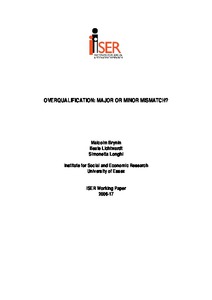Overqualification: major or minor mismatch?
"A large empirical literature suggests that a proportion of employees are over-educated (overqualified) for the jobs that they do. It also estimates the impact of this mismatch on wages. The empirical results suggest that having more education than is needed for a job generates a premium relati...
| Main Authors: | , , |
|---|---|
| Institution: | ETUI-European Trade Union Institute |
| Format: | TEXT |
| Language: | English |
| Published: |
Colchester
2006
ISER |
| Subjects: | |
| Online Access: | https://www.labourline.org/KENTIKA-19180157124919083399-overqualification-major-or-min.htm |
| _version_ | 1771659897354584068 |
|---|---|
| author | Brynin, Malcolm Lichtwardt, Beate Longhi, Simonetta |
| author_facet | Brynin, Malcolm Lichtwardt, Beate Longhi, Simonetta |
| collection | Library items |
| description | "A large empirical literature suggests that a proportion of employees are over-educated (overqualified) for the jobs that they do. It also estimates the impact of this mismatch on wages. The empirical results suggest that having more education than is needed for a job generates a premium relative to the job but at the same time a penalty relative to the qualification. This mismatch is often explained either by variation in skills or by a slow start to career. Both explanations are compatible with human capital theory. We measure the incidence of overqualification in four European countries: Britain, Italy, Germany and Norway at differing educational levels, to show that overqualification is most common at the lower levels where careers tend to be flatter. The inclusion of a measure of computer skills also seems to make little difference to the relationship between overqualification and wages. However, one issue which is important is the degree of voluntarism that is associated with progression through education. Overqualification is traditionally measured through years of education required for the job and years spent in education, but this can be separated into a part that reflects the achievement of certificates and a part that reflects the passage of time. The latter is strongly influenced by individual motivation which determines final choices and by institutional factors which might either enhance or constrain these. We isolate the number of excess years a person spends in education without reaching the next qualification level in order to use this as an instrument for over-education. Our results suggest that the impact of over-qualification on wages is rather small, and becomes even smaller when the excess years spent in education are used as instrument for over-education. Overqualification can on these results never be interpreted as a labour-market choice which provides some sort of human-capital premium." |
| format | TEXT |
| geographic | Germany Italy Norway United Kingdom |
| id | 19180157124919083399_e0b8868b5e9047359c8cf5723ee9b6df |
| institution | ETUI-European Trade Union Institute |
| is_hierarchy_id | 19180157124919083399_e0b8868b5e9047359c8cf5723ee9b6df |
| is_hierarchy_title | Overqualification: major or minor mismatch? |
| language | English |
| physical | 26 p. Digital |
| publishDate | 2006 |
| publisher | Colchester ISER |
| spellingShingle | Brynin, Malcolm Lichtwardt, Beate Longhi, Simonetta career development comparison highly qualified worker level of qualification statistics wages Overqualification: major or minor mismatch? |
| thumbnail | https://www.labourline.org/Image_prev.jpg?Archive=117017993529 |
| title | Overqualification: major or minor mismatch? |
| topic | career development comparison highly qualified worker level of qualification statistics wages |
| url | https://www.labourline.org/KENTIKA-19180157124919083399-overqualification-major-or-min.htm |

